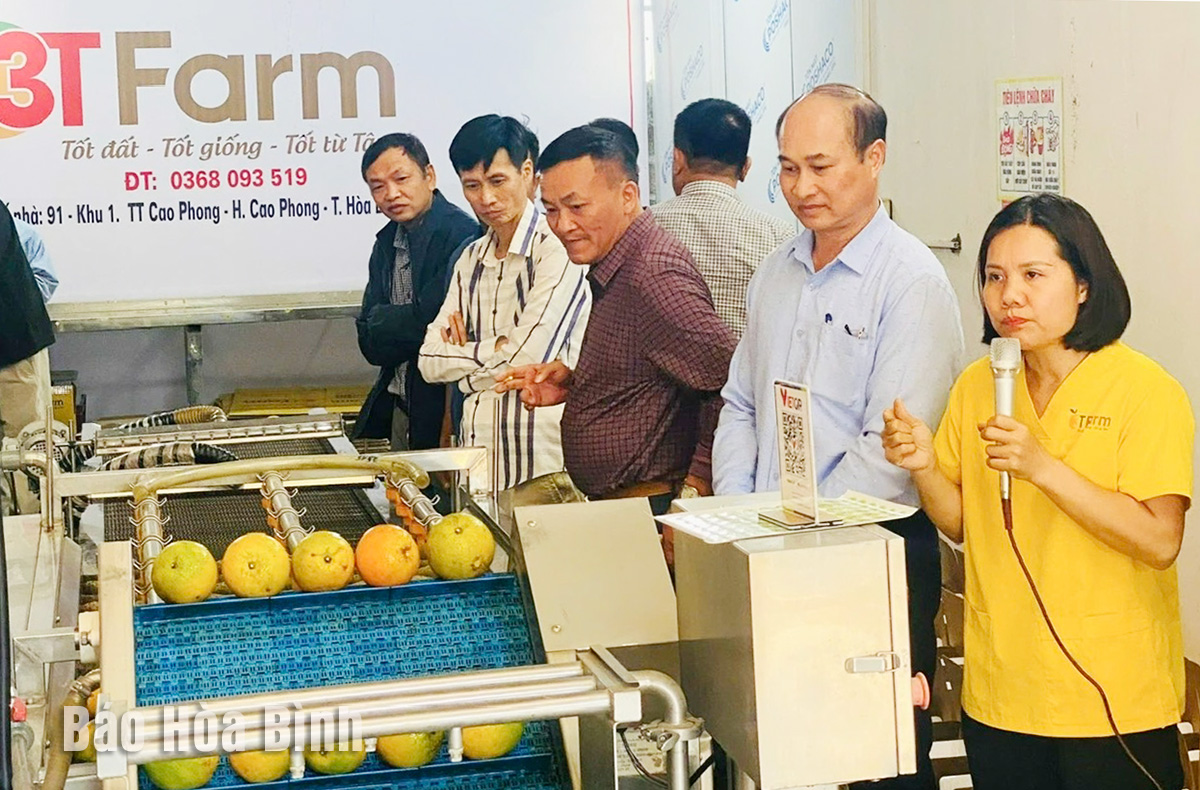Under current regulations, products in the One Commune – One Product (OCOP) programme that are rated three stars or higher must undergo re-evaluation every three months. However, in reality, some of these products fail to consistently meet the required standards, raising concerns about the sustainability of their OCOP certification. This underscores the urgent need for producers to enhance product quality and gradually develop their OCOP products into strong, marketable brands.
The 3TFarm Cooperative (Cao Phong District) pays attention to
building a brand for organically grown oranges.
Brand building is essential not only for OCOP items but for all
goods aiming to increase competitiveness in both domestic and international
markets. Through branding efforts, producers gain valuable knowledge in areas
such as ingredient selection, production techniques, product preservation, and
marketing strategies. Moreover, the registration of intellectual property
rights, including trademarks, collective marks, and geographical indications,
is crucial for protecting products from infringement. These steps form the
foundation for safeguarding, developing, and promoting products in today’s
competitive marketplace.
While many OCOP-certified products struggle to gain a foothold
in the market, several have emerged as branding success stories. A prime
example is the 3T Cao Phong Agricultural Cooperative (3T Farm), which has
effectively leveraged its strengths to turn fresh Cao Phong oranges into a
widely recognised OCOP brand.
According to Vu Thi Le Thuy, Director of 3T Farm, the cooperative registered
its orange production process with the National Office of Intellectual Property
from the outset. The farm also strictly adhered to VietGAP and organic
standards, while placing a strong focus on packaging and labeling to reinforce
brand identity. The recognition of Cao Phong oranges with a geographical
indication has provided a robust platform for market expansion and sustainable
distribution.
Beyond fruits, OCOP products derived from medicinal herbs have
also gained competitive advantages. Among the most highly rated are four-star
herbal extracts such as Ca gai leo (Solanum procumbens) and Xa den (Celastrus
hindsii) from Tuyet Nhi Cooperative (Dong Bon Hamlet, Cao Duong Commune, Luong
Son District), and black turmeric extract from Ngoc Sang Cooperative (Bac Phong
Commune, Cao Phong District).
Nguyen Thi Tuyet, Director of Tuyet Nhi Cooperative, highlighted the potential
of the medicinal sector in brand development. She noted that Hoa Binh has long
been known for its rich repository of medicinal herbs and traditional knowledge
of herbal medicine, an important advantage in branding OCOP medicinal products.
Incorporating cultural heritage into branding strategies has also yielded
positive results. Do Hung, the owner of two three-star OCOP products -ruou nep
nuong men la and ruou nep rau Yen Thuong- successfully developed the "Thuy
Thuong Xu Muong" brand by embedding ethnic Muong traditions into the
product story.
Hung explained that the brand draws inspiration from the Muong people's ancient
epic "Land and Water”, which recounts legends about the origins of land, water,
and human life. The liquor is crafted using a traditional triple-distillation
process, natural spring water, and indigenous fermentation techniques. In
collaboration with local farmers in Thach Yen (Cao Phong), the cooperative also
revived the long-lost nep rau sticky rice variety, transforming it into a
high-end liquor product.
By ensuring a stable supply of raw materials, using traditional methods, and
telling a compelling cultural story, Thuy Thuong xu Muong earned a four-star
OCOP rating. The product has received strong consumer recognition and rising
demand in the market.
Currently, Hoa Binh province boasts 121 OCOP-certified products rated three
stars or higher, including more than 40 four-star products and one five-star
product. Local producers have embraced innovation, modernised production, and
invested in high-quality packaging, labeling, and traceability systems to boost
brand identity.
To support OCOP branding efforts, the agricultural sector has worked closely
with relevant agencies to assist producers in intellectual property protection,
brand development, and marketing. This includes managing trademarks and labels,
printing certified OCOP packaging, and implementing QR code traceability.
In addition, the province has ramped up trade promotion through marketing
campaigns, exhibitions, and online sales platforms, bringing OCOP products
closer to consumers. By building strong OCOP brands, Hoa Binh aims to boost
recognition both domestically and internationally, paving the way for
sustainable growth for local producers.



